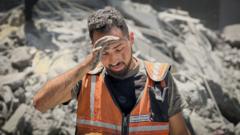Rescue worker Abdullah al-Majdalawi, stationed in Gaza City, expressed a profound sense of fear regarding his memories: "I have become afraid of my own memories." His words reflect a broader struggle faced by rescue workers amidst the intense backdrop of conflict, where they have taken on the grueling task of recovering the living and deceased from rubble. A visible reminder of their sacrifice is seen at the countless funerals where brightly colored Civil Defence vests, often stained with dust and blood, are laid upon the returned bodies.
Tragically, the efforts of the Civil Defence have come at a heavy cost. On the first day of a much-anticipated ceasefire, the agency reported that 99 rescue workers had lost their lives and 319 had sustained injuries, some of which were life-altering. Colleagues mourn their fallen, placing vests atop the deceased, a gesture that says, "This colleague sacrificed his soul to save others," according to fellow worker Nooh al-Shaghnobi.
Since the start of the conflict, Israeli bombardments have claimed the lives of over 47,000 Palestinians, primarily women and children, with injuries surpassing 111,000, according to figures from the Hamas-run health ministry, considered credible by the UN. A recent Lancet study suggested an underestimation of these figures by over 40%.
As the ceasefire persists, Civil Defence workers face a daunting task: recovering an estimated 10,000 bodies buried under debris. Al-Shaghnobi shared a recent experience where local knowledge led to the excavation of three skeletons in a flattened building, but such successes are overshadowed by immense emotional strain. He expressed, "You should become numb as time goes on, but I have become worse… I feel more pain."
In stark contrast, Israeli authorities provided extensive psychological support for hostages released from Gaza, while many rescue workers reported experiencing insufficient or no mental health support. Mohammed Lafi, a veteran Civil Defence worker, lamented that the subject of emotional recovery seems to be ignored, despite their urgent need for it.
Al-Majdalawi described his retreat into solitude, fearing the reminders of his experiences. "I do not really talk to others about what I have seen… I feel that my whole body is becoming tight," he said, indicating a need for therapy that remains inaccessible.
Despite external recognition of their heroism, these rescue workers battle a personal war within, compounded by conditions that restrict their operational capacity. Mahmoud Basal, a spokesperson for the agency, noted the dire lack of resources, stating they are working with makeshift tools and minimal vehicles.
The United Nations' OCHA highlighted the challenges ahead, suggesting that recovery may take years due to a dearth of equipment and personnel amid massive amounts of debris and hazardous materials. Families mourn the loss of hopes of closure, searching for loved ones among remains at places like hospitals, where the grim task of identification has become overwhelming.
Ali Ashour, still searching for his son Mahjoud, expressed unyielding hope, stating, "I believe I will recognise my son immediately, even if his face has no features." His determination exemplifies the emotional agony families endure while confronting the devastation surrounding them.
As rescue workers like Al-Shaghnobi aspire to honor the deceased and recover all lost individuals, the pressing need for better resources and psychological support remains unfulfilled. "All we need is the equipment and we will do it," he stated, reflecting both the dedication and desperation of those who are left to face the heavy toll of war in Gaza.




















